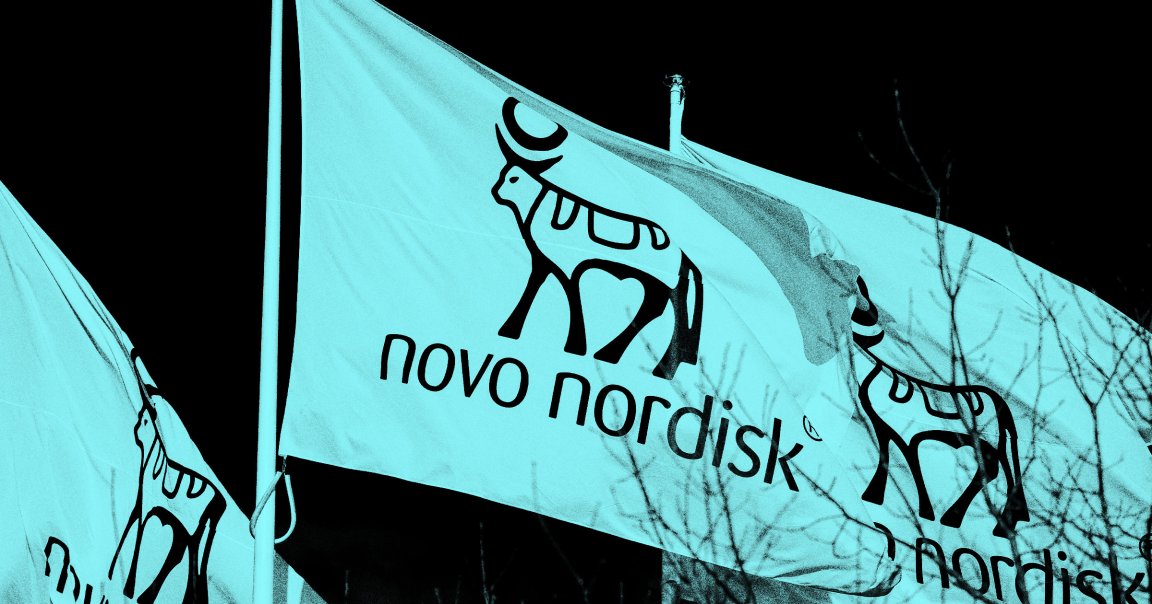
While its customers are shedding pounds, Novo Nordisk, the creator of the mega-hit drug Ozempic, is shedding loads of market value amid collapsing sales.
One year ago, the Danish pharmaceutical giant’s market cap exceeded the size of its entire home country’s economy. But lately, it’s continued its steady but drastic decline — which saw its CEO get the axe — by losing nearly $100 billion in value after slashing its sales forecast for the second time this year. Following the first revision, growth was expected to be between 13 and 21 percent, but it’s now down to between eight and 14 percent. Its share price dropped by 30 percent following the twice-updated forecast, making it its worst week in more than twenty years, The Guardian reported.
Novo Nordisk’s flagship product is semaglutide. Sold under the names Ozempic and Wegovy, it’s one of the leading GLP-1 agonist drugs that mimic a gut hormone responsible for regulating appetite and blood sugar levels, making it a remarkably effective treatment for diabetes and a powerful weight loss tool.
When a once-weekly version of semaglutide received FDA approval for weight management in 2021, it kickstarted a gold rush in producing similar weight loss drugs. All the while, studies poured in that suggested GLP-1 agonists had impressive unintended health benefits, such as lowering the risk of Alzheimer’s and heart disease, and helping treat addiction.
With semaglutide quickly becoming a best-seller, this enthusiasm helped Novo’s valuation surge to over $600 billion in March last year, making it Europe’s most valuable company. But one appetite its drugs could not suppress was the public’s voracious hunger to get their hands on them. Novo couldn’t meet the demand, setting it up for an ironic disaster: it’d discovered a red-hot drug, but its inability to provide enough of it was undermining its own business interests.
These shortages led to pharmacies selling “compounded” versions of its drugs, which are cheaper alternatives that are made by the pharmacies instead of the drugmaker. In May, the FDA cracked down on the practice — a big victory for Novo — but it hasn’t gone away. Novo believes that some one million Americans are still taking semaglutide copycats, per the Financial Times, and has asked US regulators to ban imports of a key ingredient used to compound the drugs.
Competitors have also eaten away at its sales. American Big Pharma outfit Eli Lilly overtook US prescriptions for Wegovy with its Zepbound weight loss shot last year. And a recent head-to-head trial showed that Zepbound users lost 50 percent more weight than those who took Novo’s drug.
Also haunting Novo is Lilly’s terribly-named weight loss pill, orforglipron, which a trial released in April showed was roughly as effective as Ozempic, upending expectations that an oral drug would fall short of an injectable. It’s yet to hit the market, but a weight loss pill would almost certainly rake in tons of more sales, being far more convenient than an injection. They would also, in theory, be cheaper to produce.
But the latest trial from Eli Lilly, released Thursday, brought those expectations back down to Earth. It showed that Lilly’s pill helped patients lose slightly less weight than analysts were expecting and put it more on par with Novo’s existing pill, Rybelsus. And the side effects are worrying: nearly a quarter of patients on the highest dose dropped out of Lilly’s study, Jared Holz, a health-care strategist at Mizuho Securities, told Bloomberg. It was a rare reprieve for Novo; shares climbed by over six percent on Thursday morning following the news, though overall its stock price is down nearly 60 percent over the past year.
For its part, Novo has slashed its drug prices this year and launched a direct-to-consumer online pharmacy to recoup sales lost to rivals and compounders, but it hasn’t staunched the bleeding. Overall, Novo’s sales of its semaglutide drugs grew by eight percent year on year in the first half, a steep drop from 21 percent last year.
It and the industry at large are also bracing for the effects that tariffs imposed by President Trump will have on the cost of manufacturing. Trump has also demanded that drugmakers take action to slash their prices within 60 days, threatening penalties.
More on drugs: A Side Effect of Trump’s Tariffs: Making Ozempic Way More Expensive